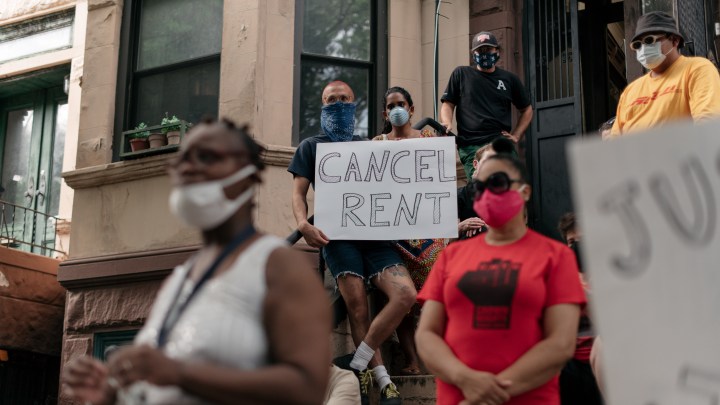
The CDC extends an eviction ban, but landlords find ways around it
The CDC extends an eviction ban, but landlords find ways around it

A year ago, Erica Bivens was working as a medical assistant at a university near Baltimore. When the pandemic shut down her campus, she was able to work from home, but she lost a lot of overtime hours. Then in August, she had to take time off for surgery.
“I didn’t get any regular pay again until September,” Bivens, 33, said.
By the end of the year, Bivens, who has a 9-year-old daughter, owed $5,000 in back rent. Her property manager told her that when her lease expired at the end of January, it would not be renewed.
“Even though in the last four years since I’ve been there, I’ve never, ever had this problem. I’ve never been behind this much. In the middle of a pandemic, they want me out,” she said.
Government relief programs eventually paid her landlord all the back rent, she said. Still, at the end of January, Bivens got notice she had a week to move out or face eviction. With her credit shot from unpaid bills, finding another place wasn’t easy.
“Even if it’s legal, it’s wrong to put somebody out and you know they’re going to be homeless,” she said.
It is legal. A federal moratorium on evictions from the Centers for Disease Control and Prevention protects renters from being evicted for not paying the rent, if they sign a document saying they’ve been affected by COVID-19. The Biden administration recently extended the ban through June 2021, giving states more time to distribute billions of dollars in federal rent relief aimed at preventing evictions during a public health crisis. Many state and local governments have other protections for renters.
But there are plenty of workarounds and plenty of lawyers eager to help desperate landlords find them. Ernie Garcia, who offers advice to landlords on his YouTube channel, is an attorney in Houston. He said the easiest way around the moratorium is the tenant holdover eviction, the kind Bivens faced in Baltimore.
“Essentially, once that lease term is terminated by written notice, there is no lease, and the CDC doesn’t protect a tenant who has held over beyond that term,” he said.
Most leases are for 12 months, so a year into the pandemic, lots of renters are in that position, Garcia said.
“We get it that, that it can be looked on as a loophole,” he said. “The way we take a look at it is, it’s really a lifeline to landlords, whose hands are otherwise tied.”
Garcia also advises landlords to look for lease violations, from criminal activity or destruction of property to much smaller offenses.
“A tenant could have an unauthorized occupant, or even an unauthorized pet,” he said.
Tenant advocates say they’re also seeing a lot of illegal tactics, like changing the locks, boarding up the doors, shutting off the utilities — also known euphemistically as the “self-help” eviction.
Viraj Parmar, with the Atlanta Volunteer Lawyers Foundation, said he’s handling a case in which a landlord gave the tenant 10 days to move out.
“After the 10-day period passed, the landlord ordered a large dumpster and just threw all of his stuff out,” Parmar said.
Far more often, just the threat of eviction is enough to send a tenant packing, said Shirley Gibson, a housing attorney with the Legal Aid Society of San Mateo County, California.
“A lot of what we’re seeing in terms of housing loss is really just based on a culture that has been baked into the landlord-tenant dynamic for decades and decades now, which is that tenants know if they don’t pay rent, they get evicted,” she said.
Even tenants with a strong case rarely fight back, she said. “They’ll go live in their car because they live in terror of having this bad credit, of having a bad tenant history, of never being able to rent anywhere ever again.”
Those who do go to court often don’t stand a chance, said John Pollock, with the National Coalition for a Civil Right to Counsel. Most landlords have lawyers; tenants usually don’t. To really protect renters, Pollock said, the moratorium needs to include access to free legal help.
“Study after study has shown that when tenants have counsel, the rate of tenants that stay in their homes dramatically increases,” he said. Even if they can’t stay, “they have longer time to move, they pay less money in rent arrears, the eviction may not be entered on their record so that they have a chance to actually find new housing.”
In Baltimore, Erica Bivens finally did find another place to live. But it took several weeks, and her landlord started the eviction process. She also had to come up with the money for a security deposit. To make that happen, she’s back on the hook to her old landlord for a couple of thousand dollars in unpaid rent.
There’s a lot happening in the world. Through it all, Marketplace is here for you.
You rely on Marketplace to break down the world’s events and tell you how it affects you in a fact-based, approachable way. We rely on your financial support to keep making that possible.
Your donation today powers the independent journalism that you rely on. For just $5/month, you can help sustain Marketplace so we can keep reporting on the things that matter to you.

















